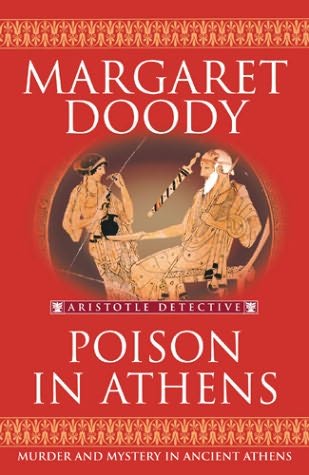Poison In Athens
by Margaret Doody

Reviewed by Coral
It's been awhile since I read the first three novels in Doody's Aristotle Detective series, so I can't really be sure, but I think this book picks up with Aristotle and Stephanos just coming back from their travels in Asia. Again, I may be wrong, but I think that's what I understood from this book.
Anyways, two prominent Athenian men, Orthoboulos and Ergokles, are engaged in a legal battle over a slave woman, Marylla, and an accusation of a deliberate assault on a citizen stemming from a brawl they had in a brothel. Athenians everywhere enjoy this scandalous lawsuit, which ends with Ergokles' claims being dismissed, though none of the bad blood between the two men is resolved.
Not long after the trial Stephanos finds himself curious about the brothel that was much talked about during the trial and heads over to, um, satisfy his curiosity. Only while he's there he ends up coming across Orthoboulos' dead body. Now as Orthoboulos' son, Krito, accuses his step-mother, Hermia, of conspiring to murder his father, Aristotle and Stephanos endeavor to learn the truth so that justice may once again prevail in Athens.
Again, not sure if it's because I absolutely suck at solving mysteries, but I was pleasantly surprised by who the killer turned out to be. Of course as Aristotle and Stephanos are questioning the killer something becomes so glaringly obvious that's it ridiculous that neither of them figure it out. Even I figured that part out!
I like the atmosphere of Doody's books. Like Lauren Haney, I find she writes a pretty authentic "ancient" setting. I don't really mind a lot when a book that's supposed to be a mystery set in ancient times sometimes detours around the mystery for a while to delve into more historical aspects (Steven Saylor's The Judgment of Caesar, as an example). Saying that, I do think that the impiety trial against the courtesan, Phryne, was rather pointless and took up too many pages.
Also, I just don't like Stephanos. I understand the necessity of the character. As a non-citizen, Aristotle doesn't have as many rights and liberties in Athens as Stephanos does. I just find him a needlessly whiny, overly contemplative, semi-hypocritical idiot.
And, lastly, this is another book with a sloppy editor. One missing quotation mark isn't so big a deal, but getting the name of two of the characters mixed up (one of Aristotle's students instead of Stephanos' brother) is a slightly bigger mistake to let slip by, no matter how similar their names might be.
Grade: B